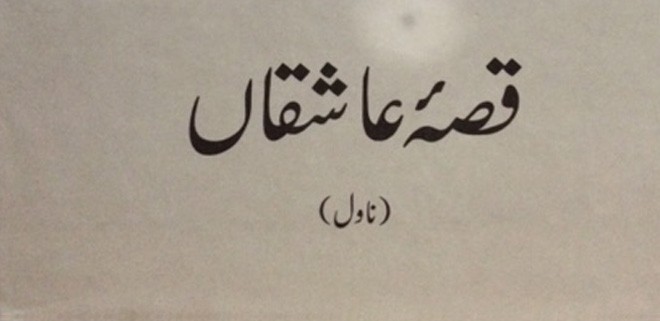
Zahid Hassan’s modern diction and raw Punjabi prose are the strength of a novel that lacks clarity of an idea or purpose

While Amir Khan’s superhit film Lagaan perpetuates several South Asian clichés with the midas touch, it also executes a quintessential fantasy of a colonised man -- of conquering either the heart or the body or both of a white woman. A similar fantasy serves as the master narrative of a recently-published Punjabi novel Qissa-e Ashiqaan by Zahid Hassan.
An American white woman, Sarah, who came to Lahore to study a local language, falls in love with the narrator, Zahoor. Sarah and her newly-arrived friend from the US, Jenny, and Zahoor and his friend Rahman take a trip up north via Islamabad and by the time they return somehow the reader has to deal with the idea that a novel has taken place.
The author makes it known early on that Garcia Marquez’s Love in the Time of Cholera and Tolstoy’s Anna Karenina will foreshadow the tragic love affair between Zahoor and Sarah, and also by referencing Walter Benjamin, Milan Kundera, and T. S. Eliot, Zahid sets himself up for failure. The failure also lies in not being able to give direction to the novel. It tries to dip into philosophy, literary discussion, and politics without seriousness.
The literary discussions seem shallow. Its attempts at cultural anthropology too are skeletal. Name dropping such as Kundera, Solzhenitsyn, and Flaubert, even Malala, can’t save the dismal narrative trajectory. All the four characters come across as flimsy. Take, for example, Jenny who has come to join her friend on a trip can’t enjoy her vacation because she keeps missing her mother and lover.
This becomes a big hurdle for Rahman, Zahoor’s friend, to get close to her. The way the American friend’s name is spelled in Punjabi, it is hard to figure out if she is Jenny or Jeannie. Saarah is always Serah in the US, though spelled Sarah. There are more careless renderings throughout the novel which affect the diction. Rahman’s character, it seems, has only been added to offer a contrast to the narrator’s better than thou self-projection.
At some point Rahman is cut loose, and the narrator suddenly remembers that since the woman in love with him is an American, he has forgotten to mention any sex between them. So he goes to buy condoms in a small northern town, fallen under the influence of the Taliban, almost losing his neck. Luckily, our Casanova is spared. Eventually the trip has turned into an unnecessary ordeal and a return to Lahore is what everyone craves.
What is the purpose of all this, one wonders. Is it to show how difficult it is to travel with a white woman in Pakistan, especially the northern areas? If I remember correctly they are almost kidnapped within minutes of arriving in Peshawar. Similar hints of life of travellers being at risk appear farcical. The reader almost wishes they had been kidnapped for it might have turned the novel more interesting.
At times it seems as if Zahid is attempting to prove that an American woman can also love a desi man like heroines of Punjabi films do. An example at random should suffice (italics mine): Entering the place, we sat. She picked up the same topic as soon as we sat down, when the waiter left putting down the knives and forks. She grabbed one of the knives and then asked me. Look here, hold this knife and slit my neck. In a way, you have already done that, symbolically, now do it in reality as well. She kept on talking louder and louder and people sitting in the restaurant stared at us as if a couple were having a quarrel. In a way, Zahid is enacting an orientalist reversal here by showing an irritated, emotional western woman pitted against a cool, detached, Camus-like eastern man! Hard to tell if this Sarah is more inspired by a Hema Malini-like character from Sholay or Glenn Close of Fatal Attraction.
Good sense prevails. Their separation becomes imminent though why they can’t get together is beyond me. People all over the world marry people with cultural and ethnic differences. But since this is essentially a love story, the lovers must part. It is Zahoor who eventually betrays her by marrying someone else after many years. Sarah is shattered. In the last section, real-life characters are invoked such as Zahid Dar, Habib Jalib, and the noted Urdu writer of French origin, Julien Columeau, who are really interested in our protagonist’s unrequited love.
This is really going beyond narcissism. This is turning into one big humanitarian tear-jerker, suggesting Lahore’s entire literary circle is equally in mourning. There are a couple of fast-forwards which could have served to make romantic tragedy more enlightening but these end up as wasted opportunities. Just when I was convinced that the author might have been trying to create a western woman in the Heer mould, the novel ends with Sarah’s words to Zahoor that she is going to get married now that he has broken his promise.
Perhaps this is a novel about an American woman who finally wakes up to reality and is ready to become a practical American woman by getting married. Just because Zahoor has married, why the hell Sarah has to marry also is beyond comprehension. The only saving grace was the freshness of Zahid’s modern diction but since it doesn’t say much, it points to the under-development and raw nature of the modern Punjabi prose that, in less dexterous hands and without the clarity of an idea, can’t support a novel with complexity or complex characters.